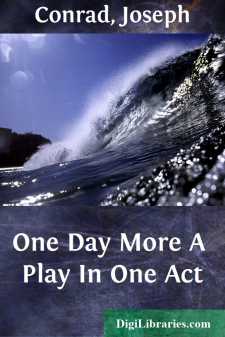Categories
- Antiques & Collectibles 13
- Architecture 36
- Art 48
- Bibles 22
- Biography & Autobiography 813
- Body, Mind & Spirit 142
- Business & Economics 28
- Children's Books 17
- Children's Fiction 14
- Computers 4
- Cooking 94
- Crafts & Hobbies 4
- Drama 346
- Education 46
- Family & Relationships 57
- Fiction 11829
- Games 19
- Gardening 17
- Health & Fitness 34
- History 1377
- House & Home 1
- Humor 147
- Juvenile Fiction 1873
- Juvenile Nonfiction 202
- Language Arts & Disciplines 88
- Law 16
- Literary Collections 686
- Literary Criticism 179
- Mathematics 13
- Medical 41
- Music 40
- Nature 179
- Non-Classifiable 1768
- Performing Arts 7
- Periodicals 1453
- Philosophy 64
- Photography 2
- Poetry 896
- Political Science 203
- Psychology 42
- Reference 154
- Religion 513
- Science 126
- Self-Help 84
- Social Science 81
- Sports & Recreation 34
- Study Aids 3
- Technology & Engineering 59
- Transportation 23
- Travel 463
- True Crime 29
Sort by:
by:
Joseph Conrad
PART FIRST To begin with I wish to disclaim the possession of those high gifts of imagination and expression which would have enabled my pen to create for the reader the personality of the man who called himself, after the Russian custom, Cyril son of Isidor—Kirylo Sidorovitch—Razumov. If I have ever had these gifts in any sort of living form they have been smothered out of existence a long time...
more...
by:
Joseph Conrad
AUTHOR'S NOTE The six stories in this volume are the result of some three or four years of occasional work. The dates of their writing are far apart, their origins are various. None of them are connected directly with personal experiences. In all of them the facts are inherently true, by which I mean that they are not only possible but that they have actually happened. For instance, the last story...
more...
by:
Joseph Conrad
I Captain MacWhirr, of the steamer Nan-Shan, had a physiognomy that, in the order of material appearances, was the exact counterpart of his mind: it presented no marked characteristics of firmness or stupidity; it had no pronounced characteristics whatever; it was simply ordinary, irresponsive, and unruffled. The only thing his aspect might have been said to suggest, at times, was bashfulness; because...
more...
by:
Joseph Conrad
I For a long time after the course of the steamer Sofala had been altered for the land, the low swampy coast had retained its appearance of a mere smudge of darkness beyond a belt of glitter. The sunrays seemed to fall violently upon the calm sea—seemed to shatter themselves upon an adamantine surface into sparkling dust, into a dazzling vapor of light that blinded the eye and wearied the brain with...
more...
by:
Joseph Conrad
AUTHOR'S NOTE "Nostromo" is the most anxiously meditated of the longer novels which belong to the period following upon the publication of the "Typhoon" volume of short stories. I don't mean to say that I became then conscious of any impending change in my mentality and in my attitude towards the tasks of my writing life. And perhaps there was never any change, except in that...
more...
by:
Joseph Conrad
What was known of Captain Hagberd in the little seaport of Colebrook was not exactly in his favour. He did not belong to the place. He had come to settle there under circumstances not at all mysterious—he used to be very communicative about them at the time—but extremely morbid and unreasonable. He was possessed of some little money evidently, because he bought a plot of ground, and had a pair of...
more...
by:
Joseph Conrad
CHAPTER ONE When he stepped off the straight and narrow path of his peculiar honesty, it was with an inward assertion of unflinching resolve to fall back again into the monotonous but safe stride of virtue as soon as his little excursion into the wayside quagmires had produced the desired effect. It was going to be a short episode—a sentence in brackets, so to speak—in the flowing tale of his life:...
more...
by:
Joseph Conrad
FIRST NOTE The pages which follow have been extracted from a pile of manuscript which was apparently meant for the eye of one woman only. She seems to have been the writerвÐâ¢s childhoodвÐâ¢s friend. They had parted as children, or very little more than children. Years passed. Then something recalled to the woman the companion of her young days and she wrote to him:...
more...
by:
Joseph Conrad
Kennedy is a country doctor, and lives in Colebrook, on the shores of Eastbay. The high ground rising abruptly behind the red roofs of the little town crowds the quaint High Street against the wall which defends it from the sea. Beyond the sea-wall there curves for miles in a vast and regular sweep the barren beach of shingle, with the village of Brenzett standing out darkly across the water, a spire...
more...
by:
Joseph Conrad
ONE DAY MORE SCENE I. CURTAIN RISES DISCLOSING CARVIL and Bessie moving away from sea-wall. Bessie about twenty-five. Black dress; black straw hat. A lot of mahogany-coloured hair loosely done up. Pale face. Full figure. Very quiet. Carvil, blind, unwieldy. Reddish whiskers; slow, deep voice produced without effort. Immovable, big face. Carvil (Hanging heavily on Bessie's arm). Careful! Go slow!...
more...











